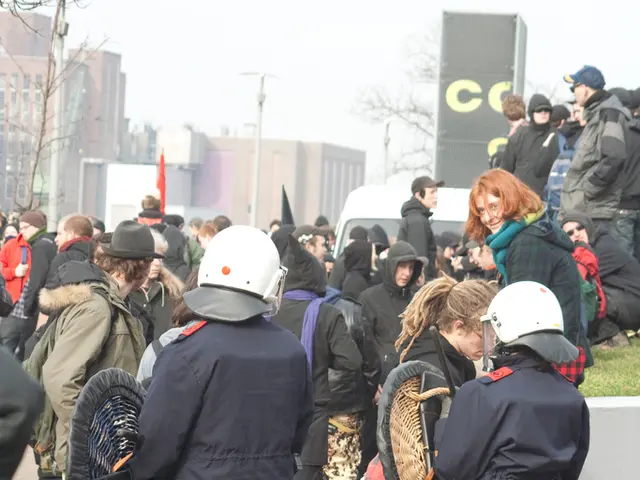U.S. scholar faces uncertain situation in Thailand amid charges of royal slur, family reports.
An American scholar finds himself entangled in Thailand's legal system, despite prosecutors dropping charges against him for allegedly insulting the monarchy, according to his family. Paul Chambers, a political science lecturer, was arrested last month in a rare case of lese-majeste against a foreigner. If found guilty, he could face up to 15 years in jail, based on a complaint filed by the royalist army.
Chambers' brother Kit told Reuters that his sibling is not permitted to leave the country, and his family in the US, including his 85-year-old mother, had thought he would be returning home. However, he remains in legal limbo, with the case still not resolved.
Although the state prosecutor dropped its charges two weeks ago, police could still pursue the case, which also includes a charge of computer crime. Chambers has lost his work visa and job at Naresuan University, and his passport was seized. He denies the charges, has appealed against the revocation of his visa and confiscation of his passport, and is contesting his dismissal.
The charges stemmed from a blurb for an online academic seminar where Chambers was a speaker, according to his lawyer. The blurb was posted on the website of a research institute based outside Thailand last year.
Thai-US tensions could escalate due to Chambers' case, as Bangkok seeks relief from President Donald Trump's tariffs on its exports. The situation has attracted "very senior-level attention" from US officials, Kit Chambers revealed, declining to identify the officials he had been in contact with.
"These senior officials assured me that if this issue is not resolved soon, it could not only impact trade talks with Thailand but it could also impact other aspects of the US-Thai relationship," he said.
Secretary of State Marco Rubio recently criticized Thailand's deportation of at least 40 Uyghurs to China, announcing sanctions on some Thai officials. A spokesperson for the State Department declined to comment on the Chambers case's impact on bilateral relations, but said it was awaiting a decision by police to carry out the prosecutor's recommendation and swiftly dismiss this case.
The US Trade Representative's Office and the Thai foreign ministry declined to comment. The White House did not respond to a request for comment.
Chambers declined to be interviewed due to the ongoing legal process, and Naresuan University declined to comment as well. Pavin Chachavalpongpun, a Thai academic at Japan's Kyoto University and a critic of the Thai monarchy, argued that the lese-majeste law serves as a "legal weapon that inflicts punishment by process" and can "paralyze lives."
Police can challenge the prosecutors' decision to drop the case. If so, Thailand's attorney general would have the final say, said Yaowalak Anuphan, the head of Chambers' legal team. "The criminal case is not completed yet," she said. A police officer with knowledge of the matter, who declined to be identified because they were not authorized to speak to the media, said the case was still being considered.
Open discussions about the lese-majeste law have long been taboo in Thailand. A court recently dissolved the party that won Thailand's 2023 election over its campaign to amend the law. Since anti-government protests in 2020 that included calls to abolish the law, 281 people have been charged with lese-majeste, according to Thai Lawyers for Human Rights. Among the 92 cases courts have ruled on since then, 53 ended in jail sentences and 14 had suspended sentences, the group said. Charges were dropped in 18 cases.
All that Chambers' family wants now is for him to come home as quickly as possible, his brother said. "Another worry is during this time that he is just in limbo, that more charges — false charges — could be brought against him," he said. "That would put him right back at square one."
[1] - If police challenge the decision to drop the charges, Thailand's attorney general would have the final say.[2] - The case could strain diplomatic relations between the U.S. and Thailand, potentially impacting cooperation on various fronts and causing concern over free speech and political repression.[3] - The use of lese-majeste laws to silence critics could lead to increased scrutiny of Thailand's human rights record by international organizations and the U.S. government, potentially influencing U.S. policy towards Thailand and impacting trade, security cooperation, and other areas of bilateral relations.
- The case of Paul Chambers, if police challenge the decision to drop the charges, could lead to increased scrutiny of Thailand's attorney general's decision.
- The ongoing legal case of Paul Chambers, particularly if it strains diplomatic relations with the U.S., may spark discussions on matters such as free speech, political repression, and education-and-self-development, given the potential impact on various aspects of U.S.-Thai relations, extending to crime-and-justice and general-news.








